“I have been living in Shanghai for 27 years. Almost my whole personal development has been right here, including my college study and entrepreneurial career. I am a Shanghainese,” said Mr. Simon Lichtenberg from Denmark in fluent Chinese. He is the Founder and CEO of Shanghai Trayton Furniture Co., Ltd. and a laureate of the Magnolia Gold Award 2019 conferred by the municipal government of Shanghai.
Lichtenberg studied as one of the first batch of foreign students in the International Cultural Exchange School of Fudan University and later started a furniture company in Shanghai. He has been making earnest efforts in social welfare and international exchanges.
The multitasking Dane is open-minded, warmhearted and energetic, with deep roots in Shanghai, excellent Chinese proficiency and ample knowledge of both the Chinese and foreigners, which has helped his splendid life in China’s economic capital.
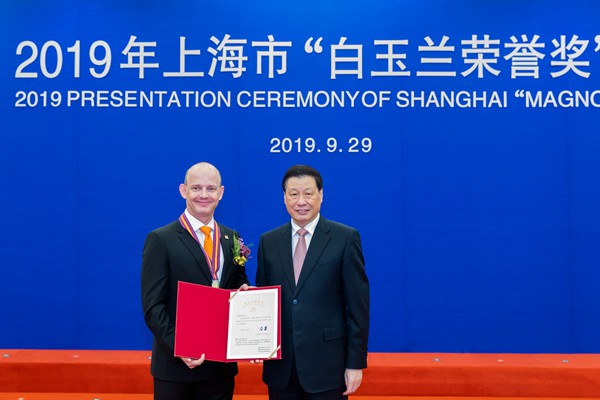
Shanghai Mayor Ying Yong poses for a photo with Mr. Simon Lichtenberg at the 2019 presentation ceremony of the Shanghai “Magnolia Gold Award”.(Photo by Pan Jiandong)
“Chinese is the best language I speak except my mother tongue”
It is eye-catching to see what fills in the category of language in Lichtenberg’s curriculum vitae. He can speak seven languages including Danish, Chinese, English, French, German, Portuguese and Marshall (a Micronesian language), among which Chinese is second only to his mother tongue.
Lichtenberg said everyone in Denmark learns at least three foreign languages, because they think language is a necessary tool to communicate with the outside world. And his experience of touring around the world with his parents since childhood has made his language skills even better. With a new goal of learning Chinese, he came to Shanghai in 1987 and studied in Fudan University.
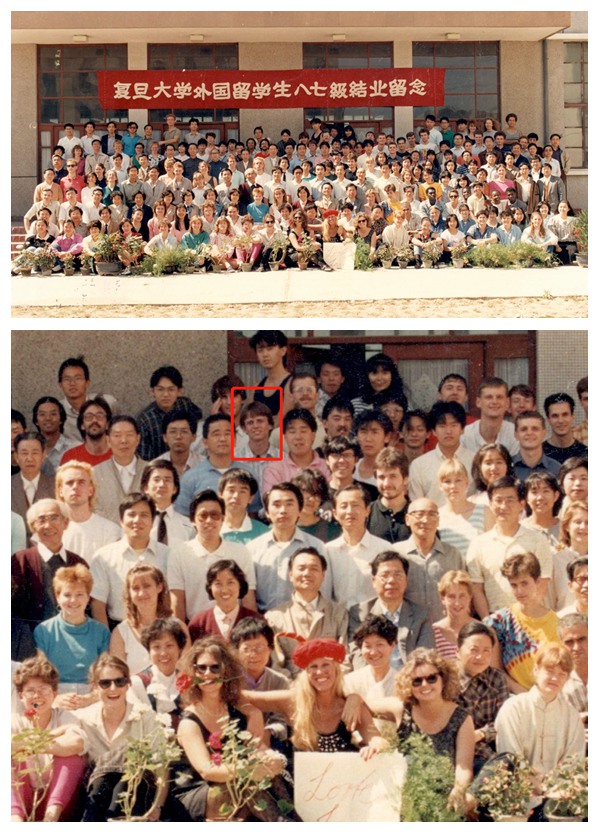
Foreign students of Fudan University pose for photos at the graduation ceremony in 1987.(Lichtenberg is highlighted.)
At that time, the young student’s impression of China came only from his mother's collection of Quotations from Chairman Mao Zedong in Danish and unique big-character posters. But it is worth mentioning that his family has been attached to China for more than 100 years.
Vihelm Meyer, his great-grandmother’s cousin, established Andersen, Meyer & Company and the factory in Shanghai, which is today’s Shanghai Boiler Works. In addition, the former Danish Ambassador to China, Christopher Bo Bramsen, is a grandson of Vihelm Meyer.
When studying in Shanghai, Lichtenberg was greatly encouraged by the city’s fast development in the process of China’s reform and opening up. After completing his overseas study and short-term work in other places, he returned to Shanghai and founded the Trayton Group two years later.
“We have a Nordic enterprise with Chinese characteristics”
Trayton Group is focused on the design, manufacturing and distribution of sofas and other living room furniture. They combine Nordic design with Made in China, providing products to more than 600,000 families every year.
When it comes to enterprise positioning and innovation, Lichtenberg’s words were simple and unadorned, “The sofa is a traditional but necessary industry. Everyone loves to sit well to enjoy their leisure time. Our innovation is mainly to upgrade product design and optimize management processes.”
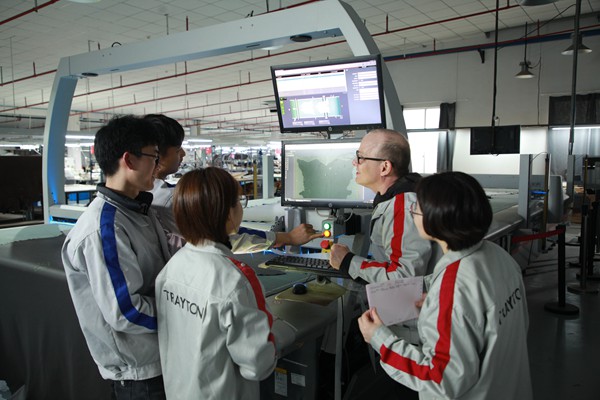
Lichtenberg discusses work with engineers and operators in the workshop in 2018.
It is interesting that Lichtenberg called his company “a Nordic enterprise with Chinese characteristics”. He explained that, “in northern Europe, employees are habituated and obligated to express their opinions, while Chinese employees are good at listening and executing.”
“We combine the two. On the one hand, a flat management level is adopted. On the other hand, we expand their multiple capabilities,” he said, adding proudly that, “90% of our employees have worked here for more than 10 years.”
As a pioneer in the design, manufacture and production of electric sofas in China, Trayton attaches importance to transformation and upgrading from the traditional sofa to high-end intelligent furniture.
Currently, Mr. Lichtenberg is making efforts to explore new retail areas, with a goal to help consumers better fit out their homes.
“Doing the most meaningful things with the least money”
Lichtenberg was engaged in philanthropy with his parents in Africa and other places in his childhood, which shaped his idea of making contributions to society. After starting a business in Shanghai, he set up a number of special funds to constantly help sick villagers and poor students in the location of his company.
In 2013, he founded the “Rural Early Education Development Fund”(REED), starting preschool classes in Butuo County, Liangshan Yi Autonomous Prefecture in Sichuan Province, one of the most impoverished counties in China.
“We want to do the most meaningful things with the least money. Education, of course, is one of the best choices. And the younger the child is, the more effective results can be achieved. Therefore, we focus on children aged 3 to 6 and help them develop good living habits and learn to speak Mandarin,” Lichtenberg said.

Lichtenberg takes a photo with children in Butuo County in June 2018.
Lichtenberg has headed to Butuo County almost every year since REED was founded. This May, he took a number of entrepreneurs, suppliers and fellows of Fudan University Alumni Association who support the project there.
One day, Lichtenberg was taking pictures while sitting on the floor of the classroom. A child saw him and stood up immediately, saying, “Uncle, don’t sit on the ground, please sit in my chair.” That made him very moved.
“These kids are very simple and considerate. Several of our companions who had been there for the first time cried almost all the time, touched by the simplicity of the children and the genuine help that the project could bring them,” he said.
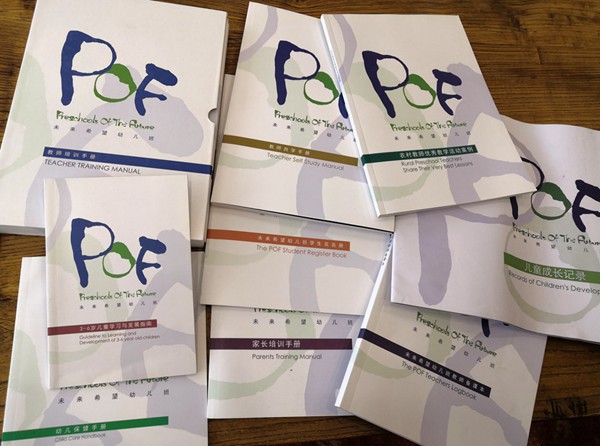
A series of educational materials for REED compiled by Lichtenberg’s Danish friends
A total of 7,000 children have benefited from REED since its establishment five years ago. “We paid some return visits, and found kids coming out of the project can speak Mandarin, have better living habits, more outgoing personalities, and are willing to participate in various activities,” he added.
“I’d like to be a bridge connecting China and foreign countries.”
Lichtenberg acquired the Foreigners’ Permanent Residence Card of the People’s Republic of China, also known as the “Green Card”, in May 2006, which was rare at that time. In the same year, he received the Magnolia Silver Award conferred by the Shanghai municipal government.
During the interview, he dug out previous iterations of the green cards and today’s Foreign Permanent Resident ID Card.
While benefiting from the preferential policies of the green card and the laurel of the Magnolia Award, Lichtenberg has offered a lot of advice and insights for the optimization of the city’s foreign-related management measures and even the improvement of its urban management level through his personal experiences.
He has also introduced local policies and convenience measures to new expats, helping them better understand and integrate into the city.
“I am a foreigner taking root in Shanghai. I understand China, especially Shanghai. I grew up abroad, so of course, I know what foreigners think. So I am able to and would like to be a bridge connecting China and foreign countries”, Lichtenberg said sincerely and confidently.
China has made some changes to the “Foreigners’ Permanent Residence Card” in recent years. Lichtenberg and other expats were invited to communicate with staff from the National Immigration Administration and the Exit-Entry Administration of Shanghai Public Security Bureau in order to improve the system.
“They were sincere to listen to our suggestions, and we were sincere too to talk about our feelings. Afterwards, some contents of the regulations were indeed revised according to our advice,” he said, detailing that, “in the past, a green card alone could not be used to open an account in a bank without a passport, but later it was OK.”
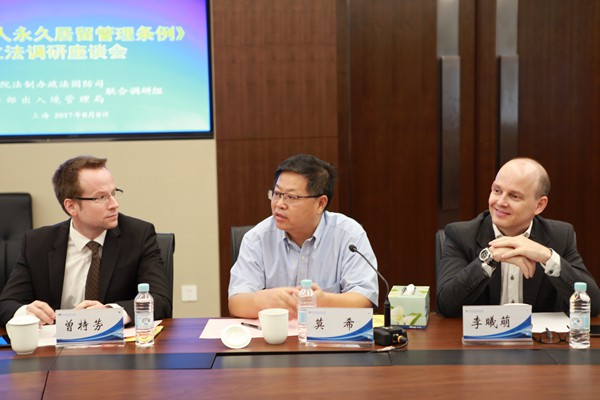
Lichtenberg participates in a symposium on legislative research for regulations regarding Foreign Permanent Residence in Shanghai, August 8, 2017.
Lichtenberg particularly mentioned the importance of accurate translation, saying that, “I can say 80% of the so-called contradictions between China and foreign countries are misunderstandings. What the two language versions say are not the same thing. It's due to cultural differences”. In this case, he helps the two sides correct the deviation, "Sometimes, I turned from being a guest to an interpreter," he said.
Besides this, Lichtenberg has served as a nonvoting member of the Chinese People's Political Consultative Conference (CPPCC) Changning District Committee and gave his advice and suggestions.
Spreading Shanghai charm and promoting international communication
With the dual experience of studying and doing business in Shanghai, as well as excellent language ability, Lichtenberg has been actively promoting exchanges and cooperation between China and foreign countries for many years.
As one of the founding members and former chairman of the Danish Chamber of Commerce in Shanghai, Lichtenberg took part in receiving a number of Danish government officials when they visited China, and held more than 200 activities of the commerce chamber.
Queen Margaret II of Denmark paid a state visit to China in 2014, and Lichtenberg joined in the reception work during her Shanghai stop.“What impressed me most,” he recalled,“was since the two countries have different habits and practices on security and etiquette, we helped them communicate and coordinate well”.
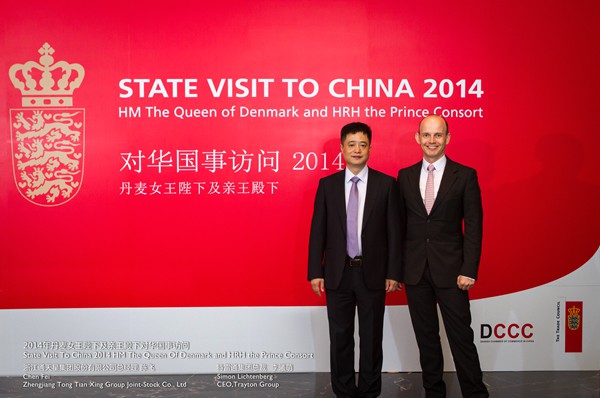
Lichtenberg joined in receiving the Danish Queen Margaret II in Shanghai during her state visit to China in 2014.
As a graduate of Fudan University, Lichtenberg pushed for the establishment of the Alumni Association for International Students of Fudan University and served as its president to help overseas students better understand Shanghai.
In 2017, he was elected as vice president of the Alumni Association of Fudan University, and he was the first foreigner to hold this post.
As a member of YPO (Young President's Organization), Lichtenberg participated in promoting Chinese to be one of its official languages and boosted exchanges between Chinese and foreign enterprise managers.
“I have too many reasons to love Shanghai”
Looking back on nearly 30 years of living in Shanghai, Lichtenberg said that, “there were too many stories, and I have too many reasons to love Shanghai.”
“Many years ago, there were also high-rises in Shanghai, with first-class hardware, but not that good software. Now both are very good. This is a big change. Especially in recent years, the urban management has been getting better and better. Living in Shanghai is convenient, efficient and safe,” he added.
Lichtenberg is also a son-in-law of a Shanghai family. All his three children grew up in China. Now, he goes back to live in Denmark for about two weeks every year.
“In previous years, my parents did charity in Africa, and I didn't go back home for several years. Now, I take my children back to visit them every year," he said, looking happily at the photos of his family on his mobile phone.

Lichtenberg performs with his jazz band.
As an entrepreneur, Lichtenberg believes that the city’s business environment and government services for enterprises are becoming better and better, adding that, “we really feel the government’s concern about us. The Customs, the Labour Department and other government agencies come to visit us and ask what difficulties we have and what they can do to help us.”
In recent years, Trayton has gradually shifted its production base to Jiashan, Zhejiang Province, with its headquarters in Shanghai concentrating on research and development. Thus, the company has needed to consider its personnel adjustment.
“The labor department came to help us as to how to balance the interests of workers and enterprise. We also set up a labor union. At the beginning, I was a little worried. Would the union be a trap?” Lichtenberg laughed, saying that, “actually it wouldn’t. The government department has been sincere to communicate and cooperate with us.”
In Lichtenberg’s opinion, the Chinese market has already been open for some time, with the hope that the door will be even wider in the future, so that more foreign ideas could be integrated into Shanghai, and foreign enterprises could participate in the city’s urban construction more deeply and comprehensively.
For him, his personal goal is to become a better “Shanghai Laowai (foreigner)”, keeping on writing his and his family’s Shanghai stories and benefiting more places and people.
Story by Wang Jiaye
Photos mainly provided by the interviewee
